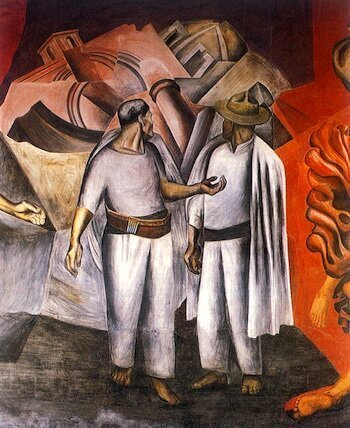Opening Doors and Launching Dreams: Might True Change Come to Hollywood?
by Marcela Davison Aviles
The best selling non-English language album in US history.
The best selling non-English language album in US history
In 1987, Linda Ronstadt’s album Canciones de Mi Padre became a global smash hit. The album is the best selling non-English language album in American history. Besides its artistic excellence, Canciones was the first Spanish-language album to achieve crossover hit status. Sustained by continued releases of crossover hits from bands like Miami Sound Machine, Los Lobos, and Santana, Latin music strode into the mainstream and stayed there.
Theatre has also enjoyed commercial success with Latinx storytelling — In The Heights, Mother Road, A Weekend With Pablo Picasso, and The Copper Children are just a few recent examples. There’s a production pipeline to source, workshop, and produce work by Latinx/Hispanic playwrights at established houses like the San Diego Rep, Oregon Shakespeare Festival, The Los Angeles Theatre Center, Teatro Campesino, Borderlands Theatre, and Teatro Bravo. The Latinx Theatre Commons, a flagship program of HowlRound, was created by Chicano and Latinx theatre artists to provide a platform for Latina/o/x/Hispanic (LH)[1] representation in theatre.
Music and theatre producers have one thing in common with banks and consumer products manufacturers: they follow the money. LH consumer spending drives the US economy, and the Hollywood box office.
But Hollywood seems to be following its own tail. Chris Rock said it best. In 2014, he wrote an essay about Hollywood So White and flashed a harsh light on the elefante in the room:
“But forget whether Hollywood is black enough. A better question is: Is Hollywood Mexican enough? You're in L.A, you've got to try not to hire Mexicans. It's the most liberal town in the world, and there's a part of it that's kind of racist [and] an acceptance that there's a slave state in L.A. … You’re telling me no Mexicans are qualified to do anything at a studio? … to be given a shot? And it's not about being given a shot to green-light a movie ... The shot is that a Mexican guy or a black guy is qualified to go and give his opinion about how loud the boings are in Dodgeball or whether it's the right shit sound you hear when Jeff Daniels is on the toilet in Dumb and Dumber…When you're on the lower levels, they're just about taste, nothing else. And you don't have to go to Harvard to have taste .…"
Well, I went to Harvard and I’m on a lower level. I’m a Hollywood Culture Whisperer. And my job isn’t just about taste. No, this gig is about translating culture. It’s my job to tell execs whether to use a wooden spoon or a chancla in the abuela-getting-mad scene; or how loud the “ay yi yi” should be in the one episode that has anything to do with Mexican or LH subject matter in the one scripted series that isn’t about drugs, cartels, sexy spitfires, or struggling immigrants yearning to be stereotyped; and whether any of the above actually is a stereotype because I work with terrific colleagues who know they don’t know what they don’t know.
I suppose it’s progress. I have a job to give my opinion about los boings. There’s been two wonderful feature films released about the same cultural holiday amongst a plethora of scripted shows about drug cartels or immigrants yearning to be free of stereotypes. Yes, there’s Los Tres Grandes and the ñew One Day at a Time, but the former is not a diversity initiative for US Latinos in Hollywood, and the latter is a unique reboot from industry elders whose resilience, sagacity, and EGOT still needed to fight off two season cancellations.
What US Latinx really want (what else?) is to direct/write/produce our own stories because we know that whoever controls narrative controls agency. And it’s not like we haven’t tried knocking on doors with this study, or this study, or this study. Or this protest. Or this Congressional hearing. Or this cartoon.
In 2020, CAA published yet another study. Their data shows an increase in diversity for scripted content, but not all racial and ethnic groups are equally represented in scripted debuts. The LH cohort is significantly underrepresented despite being one of the fastest-growing demographics in the country. This news comes after Latinx-fronted shows like The Baker and the Beauty, Vida, and (most recently) United We Fall were canceled. While 18% of the US population is Hispanic or Latinx, this group represents only 5% of actors in scripted debuts for the 2017-2019 period. As expected, the study found that white people were overrepresented, comprising 60% of the population and 65% of talent. Yet, Los Angeles, the heart of the film industry, is nearly 50% LH.
And the problem is not just about underrepresentation, it’s also what Professor Leo Chavez calls the “Latino Threat Narrative,” which is actively distributed by the national media. A quick search of the term “narcos” on IMDb proves his point. IMDb lists an astounding 247 shows about narcos and drug cartels. Since 2014, the number of scripted shows produced by LH showrunners or staffed with Latinx head writers can be counted on one hand. Even kids shows with Latinx themes like The Casagrandes and Elena of Avalor were not created by LH showrunners.
While 18% of the US population is Hispanic or Latinx, this group represents only 5% of actors in scripted debuts for the 2017-2019 period. As expected, the study found that white people were overrepresented, comprising 60% of the population and 65% of talent. Yet, Los Angeles, the heart of the film industry, is nearly 50% LH.
This year, Tanya Saracho and Jorge Gutierrez announced overall deals with Universal and Netflix. Now, the Hollywood LH Index charts 247 narco shows versus two industry deals and one Latinx sitcom reboot. But doors are opening and pipelines are launching. And that’s good ñews indeed.
[1] In an effort to ensure an inclusive frame of community reference, this essay uses the terms Latino, Latinx and Latino/a/x/Hispanic.
Marcela Davison Aviles
Marcela Davison Avilés is the "go to"professional in Hollywood for storytellers of Latinx and Hispanic subject matter who require cultural consulting, production and writing services. Her portfolio of projects with US and international studios includes Golden Globe and Academy Award winners, Emmy nominated programs, and numerous festivals and live events.
Currently, Marcela is developing an original slate of scripted and reality-based content and also serves as the lead cultural consultant/dramaturge for Pixar's Academy-Award winning feature, COCO. Her work as an elucidator of Mexican culture impacted all aspects of the film’s production and public relations, consumer products and marketing and continues in the film’s after-market extensions. She is a trusted advisor, relied upon by Hollywood studios and arts organizations to ensure their storytelling is culturally authentic and relevant.
In addition to her work in arts and entertainment, Marcela is a freelance journalist covering Latin/a/o/x/Hispanic issues.



